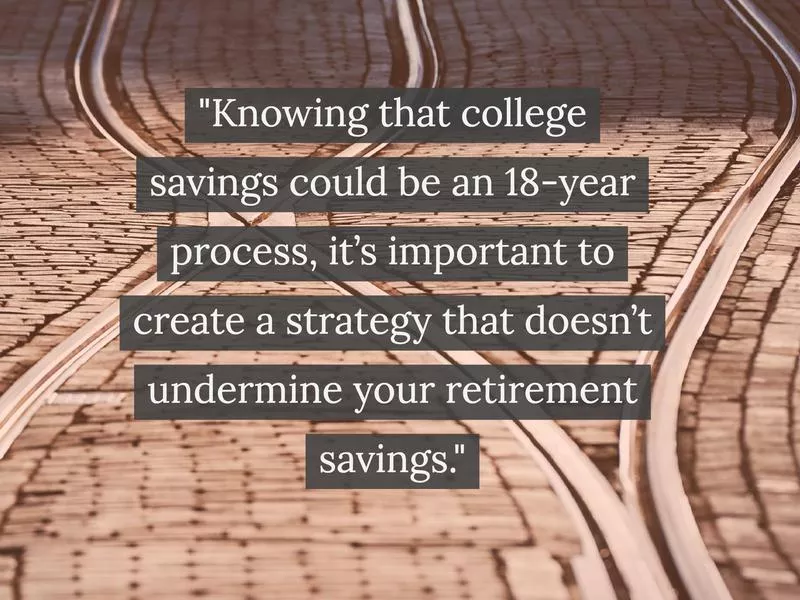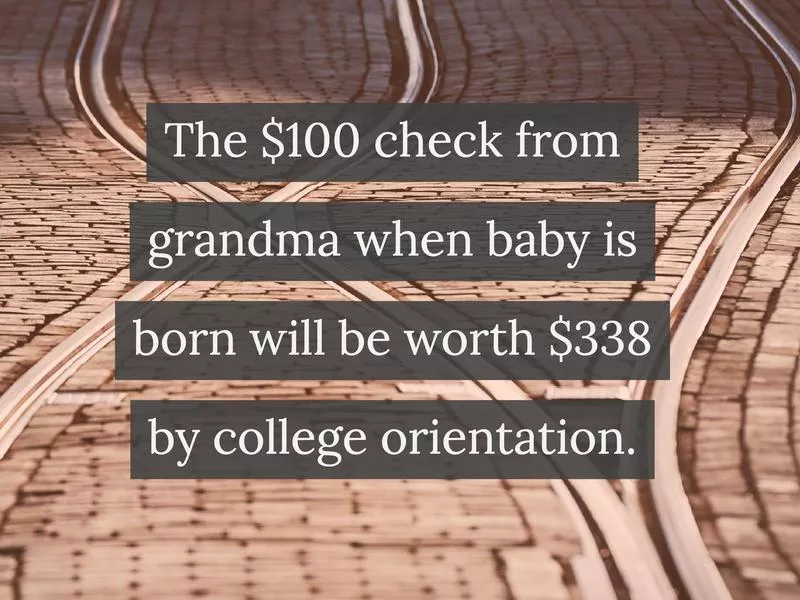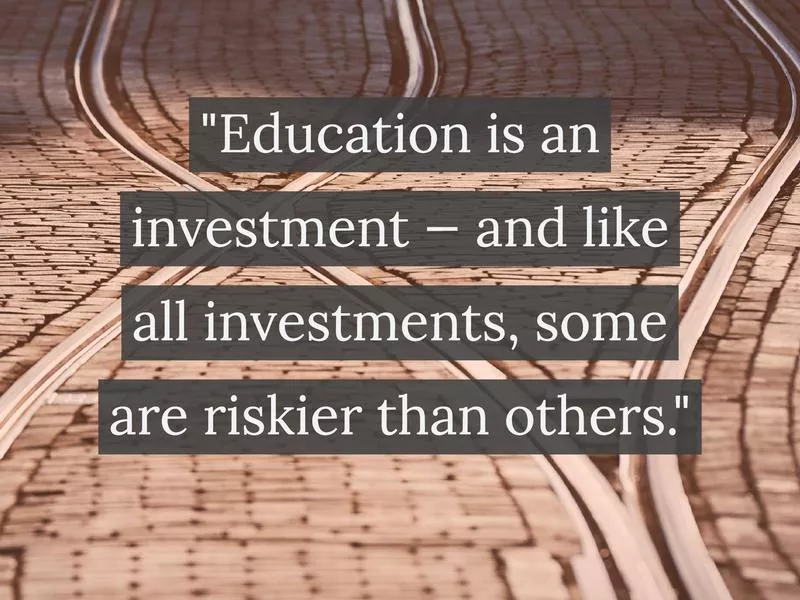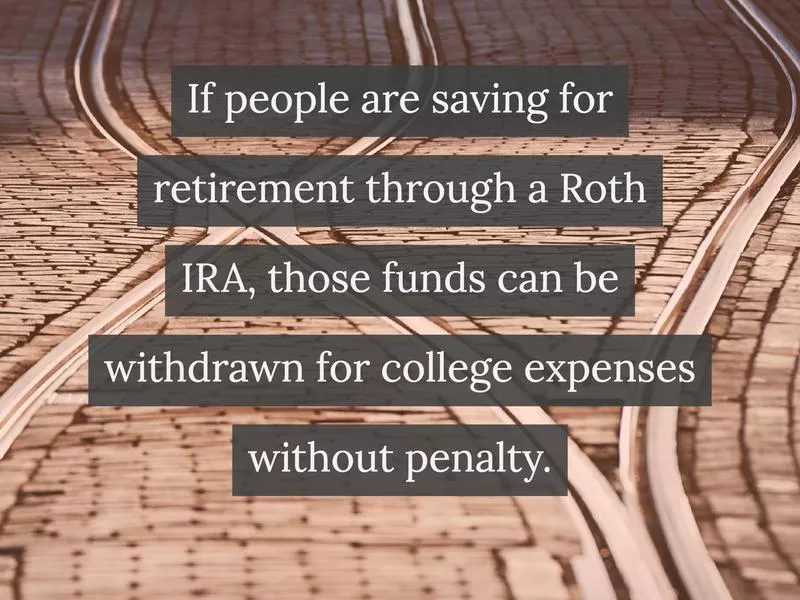Parents want to do everything they can for their children. But is saving for their college education going too far, if it means short changing yourself by cutting into money you should be putting aside for retirement?
Work + Money reached out to financial advisers for their advice — all of whom who told us it almost never makes sense to prioritize saving for your kids’ college tuition over your own retirement.
“College costs can be defrayed by securing need-based or merit-based scholarships or selecting a less expensive school,” said Benjamin Sullivan, a certified financial planner with Palisades Hudson Financial Group in Austin. “However, there are no scholarships for retirement, regardless of how much need or merit a retiree demonstrates.”
Still, with college costs expected to double in the next 10 years, saddling your kid with a six-figure tuition bill can seem extreme. So our financial planners offered advice on how to do both and how to limit the sting of those tuition bills sometime down the road.
Figure Out How Much College Is Going To Cost

While there are plenty of calculators out there to help you figure out how much you need to save before you can retire, figuring out how much to save for college tuition is much harder. The cost can vary by tens of thousands of dollars depending on where your kid decides to school and what kind of scholarships they pick up on the way.
Saving for college also offers a shorter window for letting interest do its work — usually 18 years, from birth to freshman year — meaning you have less time to recover from market recessions that eat into your principle.
Use a Calculator
The College Board offers one of the best calculators for figuring out how much you need to save on a monthly or yearly basis if you plan to foot the whole bill.
If you can reasonably hit that savings goal without cutting into the amount of money you put aside for retirement, you may want to do it: there’s no guarantee that the low-interest loan programs and grants available today will be around in their current form 18 years from now, so having that money on hand if and when it’s needed can give you some added peace of mind.
Set a Goal

Even if you know early on you won’t be able to foot all of your child’s college costs, figure out how much you want to put aside for them and set it as a financial goal. Reaching financial goals takes work and sacrifice, but putting the goal in writing means you make it a priority instead of just hoping you’ll have enough discipline to put any extra money left over at the end of the month into the college fund.
“Start by taking a holistic planning approach, including setting a target amount of money that you would want to save for your child before sending them to school,” said Tom Halloran, president of Voya Financial Advisors, the retail wealth management organization for Voya Financial.
“It also involves mapping out a thoughtful plan, factoring in how many years you have until your child goes to school and understanding how much should be saved each month at a conservative interest rate,” he said. “Knowing that college savings could be an 18-year process, it’s important to create a strategy that doesn’t undermine your retirement savings.”
How Much?
Several financial advisers recommend a third of future college expenses as a reasonable goal that most middle-class families can achieve without cutting into retirement savings. Such a number can greatly reduce the amount of debt your child will have after graduation while still allowing the family to live (and retire) comfortably.
Save Early If You Can’t Save Often

It may be tempting to use those $25 and $50 checks that come with seemingly every new parent congratulations card and baptism card for diapers and babysitters, but putting that money into a college savings account now gives it much longer to grow.
The $100 check from grandma when baby is born will be worth $338 by college orientation, assuming a 7 percent annual rate of return. Another $100 check from grandma on Junior’s 10th birthday, with only eight years to grow, will be worth $172.
Time-Value of Money
If you can’t afford to make regular contributions, make as big of a contribution as you can early on. Add in any windfalls along the way to supplement the savings, but you’re always keep in mind that you’re better off scrimping at the outset so the principal has the most amount of time to work.
Speaking of Birthdays….

If your children gets money instead of gifts, birthdays, bar mitzvahs and holidays may be a good chance to teach them lessons about prioritizing goals and values. Do they really want to use that birthday check to buy another toy, or do they want to make things easier for themselves (and their parents!) when it comes time to pay for college in the fast-approaching future?
“Rally a team. We live and breathe social media, but we still try to achieve financial goals alone,” advises Abby Chao, co-founder & COO of CollegeBacker. “We see many families using birthdays, graduations, and other events as an opportunity to give (or receive) the gift of college savings, instead of accumulating more ‘stuff.'”
Make Use of Gifts
Have a relative who always gives a gift card to your son or daughter’s favorite store on their birthday? See if you can convince them to send a check so your child can consider putting all or part of the gift towards their college savings fund.
Make Sure Your Kids Have Skin In The Game

Having your kids take out loans, work while going to school or otherwise help pay for college isn’t failing your kids: it’s teaching them a valuable lesson, according to Michelle Herd, a Senior Client Advisor with TFC Financial Management in Boston.
“Some parents find it best to have their children take on loans to appreciate the actual cost of their education and have some ‘skin in the game’,” Her said. “It is also one way that a student can start building credit history that will be helpful for them when they move out on their own (assuming they make payments on time).”
When to Release Funds
In some cases, it may even make sense to hold off on giving kids money you saved for college until after they get through their four-year program.
“After the fact, parents can choose to help pay those down those loans if at that time they have set aside ample retirement funds and can afford to help,” Herd said.
Treat Your Child’s Education Like An Investment

Education is an investment in one’s self, or, in this case, in your child. And like all investments, some are riskier than others.
As the time to choose a college draws near, you may have to have a frank conversation with your son or daughter. Is she going to college to figure out what she wants to do? Or does she want to major in a field that offers limited job opportunities or low starting salaries after graduation? This is a risky investment and you may have to steer them to a more affordable state school.
On the other hand, if she has a clear-cut idea of what she wants to do and that career is in a field where the labor supply is short, paying for the more extensive school may offer a bigger return in the long run.
Be Transparent

Kids learn how to handle money by following the model set by their parents. And a high school student looking at colleges is old enough to be given a glimpse of the family finances. Let them see what you can and can’t afford and, without making them feel guilty, let them know what sacrifices you’re making so they can go to school.
It’s also a good time to share your own experience with your child. Talk to them about how much you had to take out in loans and how your family paid for your education. Looking back on it, was it worth it? Would you have chosen a different school or major? What parts of your experience do you want your child to have, and what parts do you want them to avoid?
Be Realistic
Being realistic about what is doable is a better strategy in the long run than giving children a blank check to go where they want and hoping you’ll be able to figure out how to pay for it later.
It’s Not Where You Start — It’s Where You Finish

Students can save tens of thousands of dollars by starting at a community college or a low-priced state school to earn their general education requirements. Then, after their sophomore year, they can transfer to finish their degree at the big-name school that will get the recruiter to take a close look when she’s scanning through resumes for the entry-level opening.
This has the added benefit of letting the student know for sure if college is right for them. Better to find out if it isn’t with a few thousand dollars of tuition than find out after dropping six figures on tuition and a cross-country move to attend that elite business school.
Use Your Roth IRA To Pay For College

There are ways to pay for college with retirement savings — a good option if you find you’re ahead of the pace you set for retirement savings.
Rob Drury, executive director, Association of Christian Financial Advisors, notes that if people are saving for retirement through a Roth IRA, those funds can be withdrawn for college expenses without penalty.
“This allows one to examine if one is on pace in saving for retirement while still spending some of those funds for education,” Drury said. “Should one exceed the total contributions into the Roth, the customary 10 percent penalty for early withdrawals is waived if used for qualifying education expenses, though one would pay ordinary income tax on that amount.”
Let Us Repeat: Save For Your Retirement First

Robert R. Johnson, president & CEO The American College of Financial Services, notes that a lot of parents feel selfish when they prioritize their own retirement over their children’s education. They shouldn’t, Johnson said, and here’s why:
“If you haven’t saved enough for a child’s college education there are many options — community colleges, less expensive state schools, working and going to school part-time or student loans. In essence, with college there are options and with retirement the options are either limited or nonexistent,” Johnson said.
Secure Your Future
“The greatest fear of retirees is running out of money,”Johnson said. “And, you don’t want to burden your children with having to help provide financially for you when you haven’t saved enough and are no longer working. While it sounds selfish, one needs to ‘pay themselves first’ and save for retirement.”